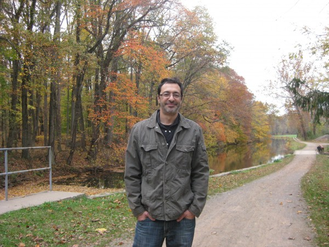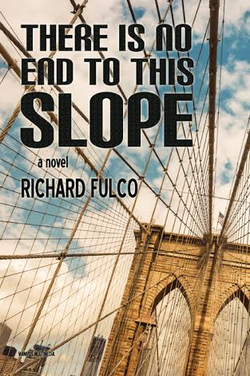 Richard Fulco Richard Fulco RICHARD FULCO received an MFA in Playwriting from Brooklyn College. His plays have been either presented or developed at The New York International Fringe Festival, The Playwrights’ Center, The Flea, Here Arts Center, Chicago Dramatists and the Dramatists Guild. His stories, reviews and interviews have appeared in The Brooklyn Rail, Failbetter, Front Porch, Bound Off, The Rusty Toque, Full of Crow, Nth Position, the Daily Vault and American Songwriter. He is the founder of the online music magazine Riffraf. There Is No End to This Slope is his first novel. RUSTY TALK WITH RICHARD FULCO Kathryn Mockler: What is your first memory of writing creatively? Richard Fulco: Five-years-old, sitting on a swing, singing silly lyrics that I wrote: “Guitar. Guitar. Guitar. I play my guitar sitting on a bench. I play my guitar with a wrench.” Those brilliant lyrics were overshadowed a few years later when I co-wrote a salacious song with my best friend: “Ain’t she sweet, see her walking down the street. Flipping her girdle, licking her tongue, making faces at you, singing ‘yeah, yeah, yeah’.” Licking her tongue. Genius. KM: Why did you become a writer? RF: I never gave it any thought really. It’s not like I sat my parents down and told them I was going to become a writer. It’s something I’ve always done. And as you can see by my prolific lyric writing, I had quite the future in prose. KM: What writers would you recommend to an aspiring writer? Or what writers were influential to you when you first started out? Who are you reading now? RF: Read everything you get your hands on. If your wife tells you that you have to read this memoir by so-and-so, then read it. If you haven’t read anything before 1980, try it on for size. See what the old-timers were doing before Ted Talks and Netflix. KM: What is the best literary advice you've gotten that you actually use? RF: Finish the fucking thing. No matter what it is—a poem, short story, essay or screenplay— just complete it. Chances are it’s shit, but at least you have something under your belt, something you can learn from, something you can build upon. KM: How do you approach revision? RF: Revising isn’t easy—I’d choose a colonoscopy over revision every time—but my method is fairly easy. It’s primitive but it works for me. Whatever I don’t like I cut. A word. A phrase. A character. A scene. Delete. Delete. Delete. Delete. I’m not attached to anything I write. Everything is under severe scrutiny. The death of good writing is falling in love with your own words. If I can be critical of Faulkner or McCarthy, hell I have to be even more critical of my writing. Right? KM: You founded the online music magazine Riffraf. Can you tell us about the site and how you got it started? RF: I really wish that I were a musician. I played in bands for a while and let’s face it, it’s a lot more fun than sitting in a coffee shop or at your desk by yourself, staring into a computer screen, fucking up your eyes, drinking too much coffee and reliving the shit that you experienced as a child. My wife urged me to write about music, so I started Riffraf four years ago. At the time, I knew absolutely nothing about blogging. Still don’t. KM: Your first novel There Is No End to this Slope, which is coming out in March 2014 by Wampus Multimedia, is about an aspiring writer who has difficulty living in the present because of his obsession with the past. How did you come up with idea for this novel? And what was the writing process like for you? RF: In his “Note To The Reader” in Look Homeward, Angel, Thomas Wolfe wrote, “This is a first book, and in it the author has written of experience which is now far and lost, but which was once part of the fabric of his life…we are the sum of all the moments of our lives—all that is ours is in them; we cannot escape or conceal it.” KM: Were there any writers that influenced There Is No End to This Slope? RF: Here’s a partial list of works that influenced the writing of There Is No End to This Slope: Ernest Hemingway’s A Moveable Feast, Michael Thomas’ Man Gone Down, Frederick Exley’s A Fan’s Notes, Charles Bukowski’s Post Office, J.M. Coetzee’s Waiting For the Barbarians, Walker Percy’s The Moviegoer, Samuel Bekett’s Waiting for Godot and Endgame, Harold Pinter’s Birthday Party, Franz Kafka’s Metamorphosis and The Castle, Richard Yates’ Revolutionary Road, Joshua Ferris’ Until We Came to the End, William Faulkner’s The Sound and the Fury, J.D. Salinger’s The Catcher in the Rye, the poetry of Robert Desnos, the songs of Lennon and McCartney, George Harrison, Jeff Tweedy, Bob Dylan, Paul Westerberg, Jagger and Richards, Otis Redding, Stevie Wonder and Lou Reed. KM: What is your favourite literary moment, if you have one. RF: I wrote one play, submitted it to Brooklyn College’s MFA program in Playwriting, and the next thing I knew I was sitting around a table with aspiring playwrights. I think it was the biggest act of fraud ever perpetrated. On myself (that is). KM: What are you working on now? RF: I’m working on a rock and roll novel that is based on Pink Floyd’s founder Syd Barrett. I can’t wait until it’s done so I can go out and hear some live music.  RICHARD FULCO'S NOVEL There Is No End to This Slope, Wampus, 2014 Description from the publisher: John Lenza, an aspiring writer from Brooklyn, hasn’t completed a novel, a play, or any other publishable work. His obsession with his part in the death of his best friend Stephanie in high school undermines his confidence and self-esteem. His struggle to reconcile his lingering guilt with the possibilities of the present sets the tone for Richard Fulco’s emotionally charged debut novel, There Is No End to This Slope. By day, John sells textbooks to New York City schools. Like a 21st century Willy Loman, he drifts through life, letting things happen to him rather than taking charge of his life. On a sales call he meets his future wife, Emma Rue, an impulsive semi-alcoholic. At a “writerly” coffee shop near his new digs in Park Slope he meets Teeny, an overweight gay man, who mines John’s life for his own creative material. A homeless man, Richard, becomes a voice of reason, while Pete the landlord worries about whether John is truly taking “special” care of those beautiful wood floors in the apartment. At one point John describes himself as intelligent, perhaps too intelligent to do anything. He and many of the other characters find it difficult to navigate the day-to-day while nurturing a sensitive and creative spirit. Should John be tortured by something that happened so long ago? Or is he using an old trauma to sidestep his creative responsibility and potential? Through deeply wrought characters and scenes, Richard Fulco touches on a fundamental issue that drives great artists to self-destruct. But when John has wrung all he can out of his pained self, it may be the mundane certainties of life that ultimately save him. THERE IS NO END TO THIS SLOPE EXCERPT We limped into 2004. I made my customary New Year’s resolution: stay at home and watch the incomparable Dick Clark. I really wanted to be alone, so I had been urging Emma to shack up with Pamela, who had offered her a place to stay until her new apartment was ready, but for some reason she lingered in our place until the insufferable end. At least I tried my best to make the most of our last night together by making dinner and renting our favorite movie, When Harry Met Sally. That’s more than I could say about my soon-to-be-ex-wife, who spent the entire evening packing and getting ready to move out the next morning. It was only fitting that our marriage should dissolve on such a trivial holiday, one that we both despised. New Year’s Eve is just an excuse to get drunk, stay up all night, do regrettable things, and blame the lure of the evening for any bad behavior. I had spent every New Year’s Eve in New York, thirty-six of them to be exact, but never considered, not even for a second, going to Times Square to watch the ball drop with thousands of screaming, intoxicated tourists. I had also refused to pay an outrageous sum for some below-average prix fixe dinner at a trendy café that felt justified in ripping off its customers because it offered a complimentary glass of cheap champagne. So there I was, greeting the New Year, bidding the old one good riddance, anticipating my independent life while standing at the threshold of something new and unknown, and that prospect thrilled, overwhelmed and terrified me. Comments are closed.
|
Rusty Talk
Rusty Talk Editor: Archives
November 2017
Categories
All
|

 RSS Feed
RSS Feed
